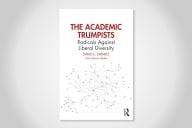You have /5 articles left.
Sign up for a free account or log in.
In a scene in the widely produced musical The Fantasticks, three men, one dressed as a stereotypical Native American, abduct a young woman and refer to what happens as a “rape.”
Both the show’s lighthearted treatment of the “rape” and the Native American costuming choices and depiction were likely not awkward to overwhelmingly white audiences back in the 1960s, when the musical was first produced and started to attract fans. But for contemporary audiences, such elements land differently.
Native American high school students walked out of a performance of The Fantasticks at the University of Wyoming last week.
Theater will sometimes shock and infuriate its spectators, and that includes those who protested the Public Theater’s run of The Tragedy of Julius Caesar in New York. The titular character wore an elongated red tie and coiffed helmet hair indicative of President Trump, prompting outrage at his assassination.
Experts in the field of collegiate drama said institutions grapple with countless factors when selecting their seasons, among them how to handle racism, sexism and homophobia in plays with such biases evident, and how to cast shows that would have once had all white actors. They further must think about the political implications of productions.
Gregg Henry, artistic director of the Kennedy Center’s American College Theater Festival, said that institutions have become much more attuned to issues of equity and diversity when building their theatrical lineup, though some more homogenized areas of the country haven’t needed to yet. (By coincidence, a different Gregg Henry, an actor known for his work on Scandal and Gilmore Girls, played Caesar in the Public Theater's production this summer.)
In recent years, students have become much more resistant and won’t “put up” with insensitivity in theater, Henry said.
Henry empathizes with the students who walked out of the University of Wyoming production, because the struggles of Native Americans have been overlooked and the population has been underrepresented in popular culture, even as The Fantasticks plays into stereotypes amid a larger love story plot, he said.
“Wyoming has a huge population of Native Americans, and if the university is trying to open their doors to that population of students, this is probably not the best way to do it,” he said.
The rights to most shows must be purchased and explicit permission must be obtained to alter the script.
The cast, crew and production team of The Fantasticks noted this in a lengthy defense of the show in the Laramie Boomerang. Their challenge in producing the show, they said, was providing context.
“The use of ‘Indians’ as stock characters, alongside pirates and bandits, as a shortcut for exotic and dangerous outsiders, is now coming to the fore as problematic. Whether it is unquestioned, as in Peter Pan productions the world over, or painfully obvious, as it was for our audiences on opening night, this kind of portrayal deserves consideration. In this case, it is an actor playing a two-bit actor playing a stock character from his traveling troupe, and truly reductive and indicative: a caricature. With historical productions, we see a point in time that is different from our own, and character portrayals that can be painful to watch to 21st-century audiences.”
Inserts will be placed in the programs warning patrons about the controversial pieces of the show going forward.
Tony Hagopian, the business and communications director for the University Resident Theatre Association, an organization of 40 or so member graduate theater programs, said institutions try to deliver holistic education to their students, with experiences in everything from Shakespearean classics to contemporary work.
Students learn text analysis with Shakespeare, a lesson that extends far beyond a single production, and with more recent plays, they are exposed to current issues and how to work with contemporary playwrights, Hagopian said.
They can benefit from a show like The Fantasticks, which contains meaty roles perfectly catered to young college actors, and experience the magical realism concept becoming more popular in today’s shows -- where life is essentially portrayed as real-world with some surrealistic twists, he said.
“In some ways it’s tough, some of these things we may not think of as controversial or problematic, if you’re just considering a play on paper,” Hagopian said. “It’s pretty rare that we’re going to provoke our audience. So, it’s more about the process for handling these things when they arise, because it’s usually going to be a surprise to you.”
Colleges and universities know they must teach their students about these “foundational plays,” said Henry.
But performing plays that feature enslaved people on a plantation, for instance, could prove difficult, he said. Institutions want to provide diverse and challenging parts for students of color and not pigeonhole them.
Marketing also figures into decisions -- though it’s not the primary aim to sell tickets, programs “need to fill the house,” Hagopian said.
Shows have previously been canceled over community backlash.
Stanford University in 2014 canceled a production of the musical Bloody, Bloody Andrew Jackson, based on the former president's life, after protests that the production was offensive to Native Americans. (Defenders noted that the bias against Native Americans in the show was largely an indictment of Jackson and other American politicians who treated them as less than human.)
Britain's University of Bristol in 2016 halted performances of the opera Aida after criticism that white actors had been cast in key roles designed for people of color.
Shakespeare's plays, which are in the public domain, can often be molded to fit an artistic vision, and Henry anticipates many iterations of Julius Caesar, and other politically geared productions, at the Kennedy Center’s fall festival in light of the partisan climate -- it’s impossible not to think of the current administration when producing Julius Caesar, because it’s a fallback play to anyone who wants to discuss the death of democracy.
Both Henry and Hagopian said they were frustrated by the hot-button Trumpian symbolism in the New York production overshadowing the message of the play. Caesar’s assassination happens at the end of the first act -- and the criticism has not focused on the aftermath of losing the leader, on which the second act centers.
“There’s a lot of interest in political theater,” Henry said. “I think we’re going to be running into a lot of it, whether that’s directly into it, or coming at it from the side, with contemporary playwrights grappling with it in a new way.”








